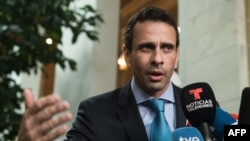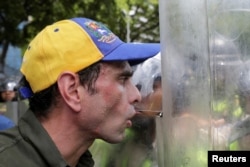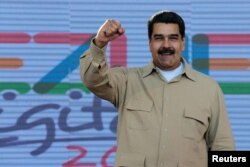Venezuelan opposition leader Henrique Capriles on Friday was banned from holding political office for 15 years, a move that could galvanize protests against the leftist government and upend a presidential election scheduled for 2018.
Capriles, a two-time presidential candidate and current governor of Miranda state, was seen as the opposition's best hope to defeat President Nicolas Maduro.
The national comptroller banned him from office because of "administrative irregularities," including violations of contracting laws and improper management of donations from the British and Polish embassies, according to a copy of the ban.
The punishment deals a blow to the opposition after stepped-up protests this week and accusations that Maduro, the unpopular handpicked successor of the late Hugo Chavez, was leading the country to dictatorship and cracking down on dissent. Critics said the ban was a ploy to derail the opposition in next year's vote and thereby perpetuate a nearly two-decade long leftist rule amid a brutal economic crisis.
Saturday protest
The ban also will most likely fuel anger ahead of an opposition protest planned for Saturday. That will follow a string of violent marches, spurred by the Supreme Court's assumption of control of congress last week before an outcry forced it to retreat.
A young man died in violence linked to protests Thursday.
"URGENT: I inform the country and international public opinion that I am being notified at this very moment of a BAN for 15 years," Capriles tweeted Friday, adding that his lawyers would provide details later.
Over the last few days, authorities had accused Capriles of fomenting violence and bloodshed by leading increasingly intense protests against Maduro.
Capriles' punishment falls within a decade-old policy at comptroller's office known as "disqualification" that blocks politicians from holding office if they are deemed to have committed "irregularities" in managing state resources.
The comptroller's office notification to Capriles said he had 15 working days to appeal the decision at that office or 180 days to ask for its annulment at the top court. Both are pro-government and unlikely to overturn the decision.
When asked about the donations mentioned in the ban, the British Embassy declined to comment, while the Polish Embassy did not immediately respond.
The government said the comptroller's investigations were part of its anti-corruption efforts. Opposition leaders said they were arbitrary mechanisms that allow the ruling Socialist Party to sideline popular politicians without due process.
Scores of political prisoners
The decision to politically neutralize Capriles will most likely stoke tensions in Venezuela, where more than 100 political prisoners are now being held, according to the opposition and rights groups.
A ban on Capriles — a sports-loving lawyer who has tried to shake the opposition's reputation of elitism by focusing on grass-roots efforts with poor Venezuelans — would mean the country's two top opposition politicians are barred from taking on Maduro.
Fellow opposition leader Leopoldo Lopez, Venezuela's best-known jailed politician, was himself barred from office in 2008, when he was the popular mayor of a Caracas district.
Lopez had been expected to challenge Chavez in the 2012 presidential election but was forced to hand the baton to Capriles, who lost that vote and a second, much closer one against Maduro after Chavez's death. Lopez was later jailed amid violent protests in 2014.
Maduro's government says a U.S.-backed business elite is responsible for Venezuela's economic downturn and is trying to foment a coup to impose right-wing rule under the guise of peaceful protests.
"Mr. Capriles, you're trying to ignite the country," Socialist Party official Freddy Bernal said during a government rally Thursday. "You're looking for deaths. Don't then come like a sissy saying that you're a political prisoner."
Capriles signaled he was not stepping down, by tweeting, "I'm still here and still your governor, we got here through votes and only the people decide."
Teen fatally shot
Venezuelan authorities confirmed a 19-year-old man was killed Thursday during demonstrations, the first death since the Supreme Court controversy blew up last week.
The public prosecutor said later Friday that it would charge Police Officer Rohenluis Mata with the death of Jairo Ortiz, who the interior minister said was not a protester.
Opposition leaders said Ortiz was shot as authorities tried to break up the protest in the hilly, low-income Carrizal area on the outskirts of Caracas.
Local media reported Ortiz was a university student planning to emigrate from Venezuela, like many in the middle class.
Venezuela's oil-dependent economy is suffering from a brutal recession that has millions of people skipping meals because of steep inflation and low salaries.
"We're not only protesting Jairo's assassination, we're also protesting this coup, and we're asking for the opening of a humanitarian channel," said Carlos Arancibia, 25, a writer demonstrating against Ortiz' death in a small march Friday.







